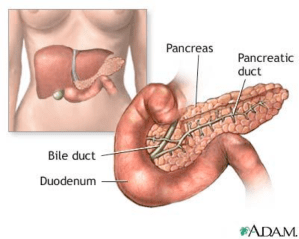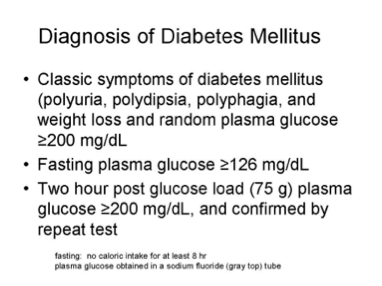Definition
Diabetes = “excessive urine‟ Mellitus = “honey sweet‟
DM is a group of disorders characterised by hyperglycaemia
▫ Hyper = too much ▫ Glycaemia = “sugar in the blood‟
- DM is a disorder of metabolism
- Most of the food people eat is broken down into glucose, the form of sugar in the blood
- After digestion, glucose passes into the bloodstream, where it is used by cells for growth and energy
- Insulin is a hormone produced by the pancreas, a large gland behind the stomach
- For glucose to get into cells, insulin must be present
- When people eat, the pancreas automatically produces the right amount of insulin to move glucose from blood into the cells
- In DM, the pancreas either produces little or no insulin, or the cells do not respond appropriately to the insulin that is produced
- Glucose builds up in the blood, overflows into the urine, and passes out of the body in the urine
Types of DM-T1 and T2
T1DM is caused by the destruction or dysfunction of insulin-producing beta cells by the cells of the immune system
In T2DM, beta cells decline gradually over time, and insulin resistance plays a role in the disease – More common (90-95%) of all cases (US/UK)
Pathophysiology of T2DM
Risk factors
- Obesity
- Family history
- Ethnicity
- Gestational DM
- Increasing age
- Sedentary lifestyle
- (BP and high cholesterol)
Obesity & T2 DM
• Up to 80% of all cases of T2DM would not exist if there were no obesity
• Obesity is associated with insulin resistance
-Blood sugar levels often normalise with weight loss
▫ Even 5-10% reduction in weight has a significant effect
• Note that it is possible for T2DM to exist in normal weight individuals, but this is rare
Signs and Symptoms
The classic triad-
• Polydipsia = excessive thirst • Polyuria = excessive urination • Polyphagia = excessive hunger
1. None
2. Polydipsia
3. Polyuria
4. Polyphagia
5. Fatigue
6. Recent weight loss
7. Recurrent infections
8. Others, depending on the organ/s involved
In addition to above, commonly seen symptoms by doctors: Obesity , Evidence of micro- or macrovascular complications , Evidence of neuropathy, Recurrent infections (e.g. thrush)
How is it diagnosed?
- History and examination
- BSL
- Fasting blood glucose
- Glucose tolerance test (GTT)
- Urinalysis
- HBA1C
- Autoimmune markers
Underdiagnosis
DM may be present for years in the absence of symptoms or signs. Up to 50% of diabetes cases goes undiagnosed, especially in developing countries
In the period prior to diagnosis, significant and potentially irreversible end-organ damage may occur. Prevention and early recognition are important to minimise the impact of complications
Prevention
Eat well : Around 80% of people with Type 2 diabetes are overweight when diagnosed. Eating a healthy diet that is low in salt, sugar and fat with lots of fruit and veg is a simple way to prevent diabetes.
Be physically active: Apart from making you feel good, getting regular exercise can reduce your risk of developing Type 2 diabetes by up to 64%.
Stop smoking: Smoking’s not just bad for your lungs. It can also lead to high blood pressure which causes heart disease, and this is a major risk factor for developing Type 2 diabetes. The risk of dying from heart attack is 5 times higher in folks with diabetes.
Watch your waist: Putting on the pounds round your midriff increases your risk. If you’re a man and your waist is 37 inches or more, or you’re a woman and your waist is over 31.5 inches, then you could be at risk of Type 2 diabetes.
Get checked out: Type 2 diabetes can lay undetected for up to 12 years, which means that 50% of people already have serious complications by the time they’re diagnosed. If you have a large waist, are over 40 and a close member of your family has diabetes, you should get a diabetes test.
Treatment
I have deliberately omitted the section on treatment. I am not qualified to dispense medical treatment advice, kindly consult your doctor. Kindly note that none of the above constitutes medical advice; it is only shared as public health information. Always speak to a qualified medical practitioner






















diabetes mellitus is quite hard on the patient and anyone suffering from it.:
Look at all of the best and newest blog post at our new web site
http://www.healthmedicinecentral.com/pulled-neck-muscle/
LikeLike
Pre-diabetes mellitus is actually a condition in which your blood glucose levels are elevated, but not high enough to be considered diabetes. It’s a condition that comes before type 2 diabetes and is sometimes called impaired fasting glucose or impaired glucose tolerance.Pre-diabetes mellitus has become more prevalent within the U.S. affecting as many as 55 million Americans and millions more worldwide. It has already been diagnosed in millions of people, and yet millions of others still have no idea of their condition. The treatment costs of diabetes averages about $174 billion each year.,
Most current article content on our very own homepage
<http://www.foodsupplementdigest.com/essential-amino-acids-list/
LikeLike
I’ve been desperatly craving sweets for the past few months. I even got to the extreme situation of eating a soup spoon full of sugar. I’ve heard that losing weight, drinking a lot of water
and urinating frequently are diabetes symptoms, but I haven’t been experiencing neither of them. Other than the craving, everything is normal. . . Thank you in advance!.
LikeLike